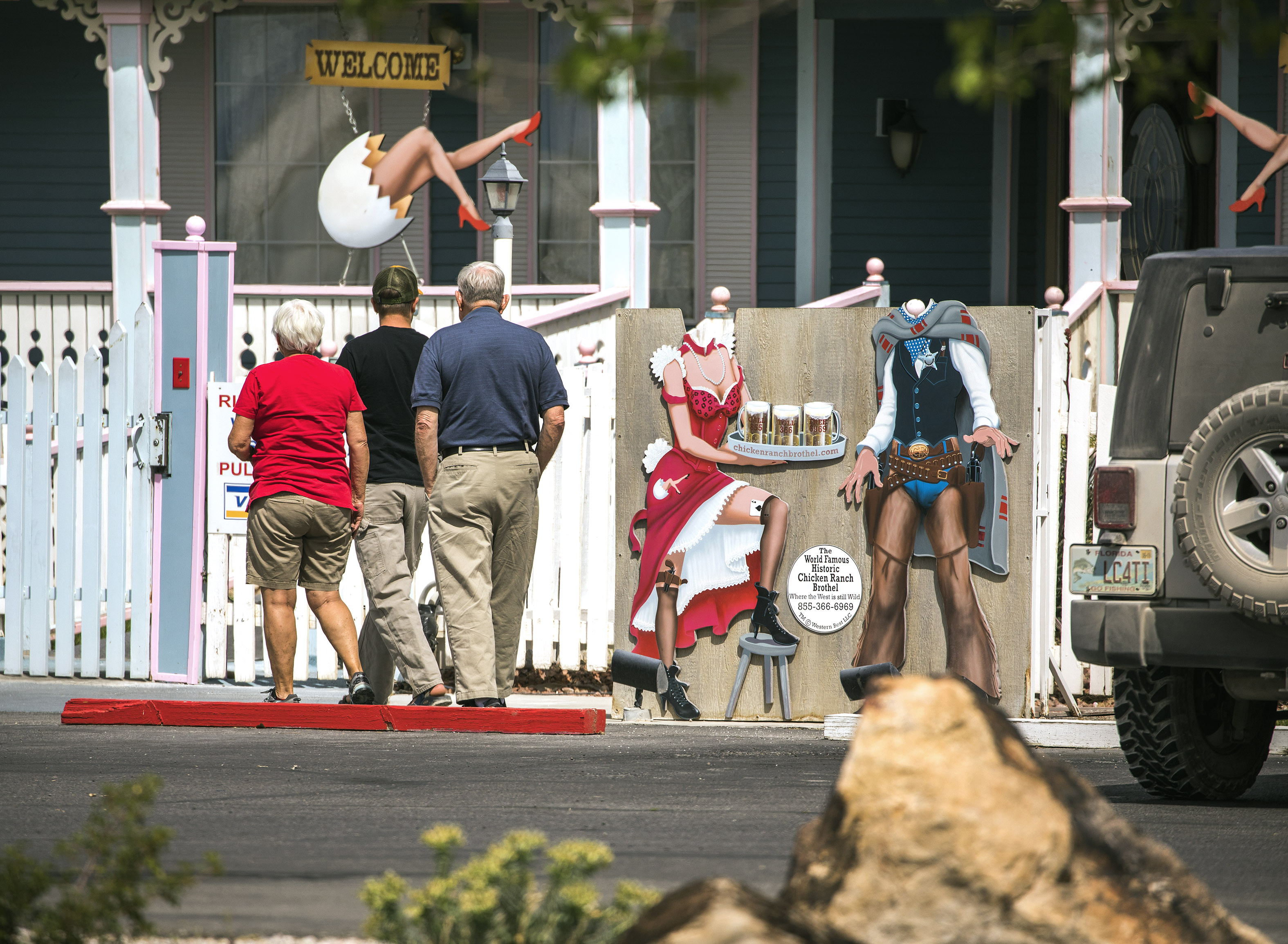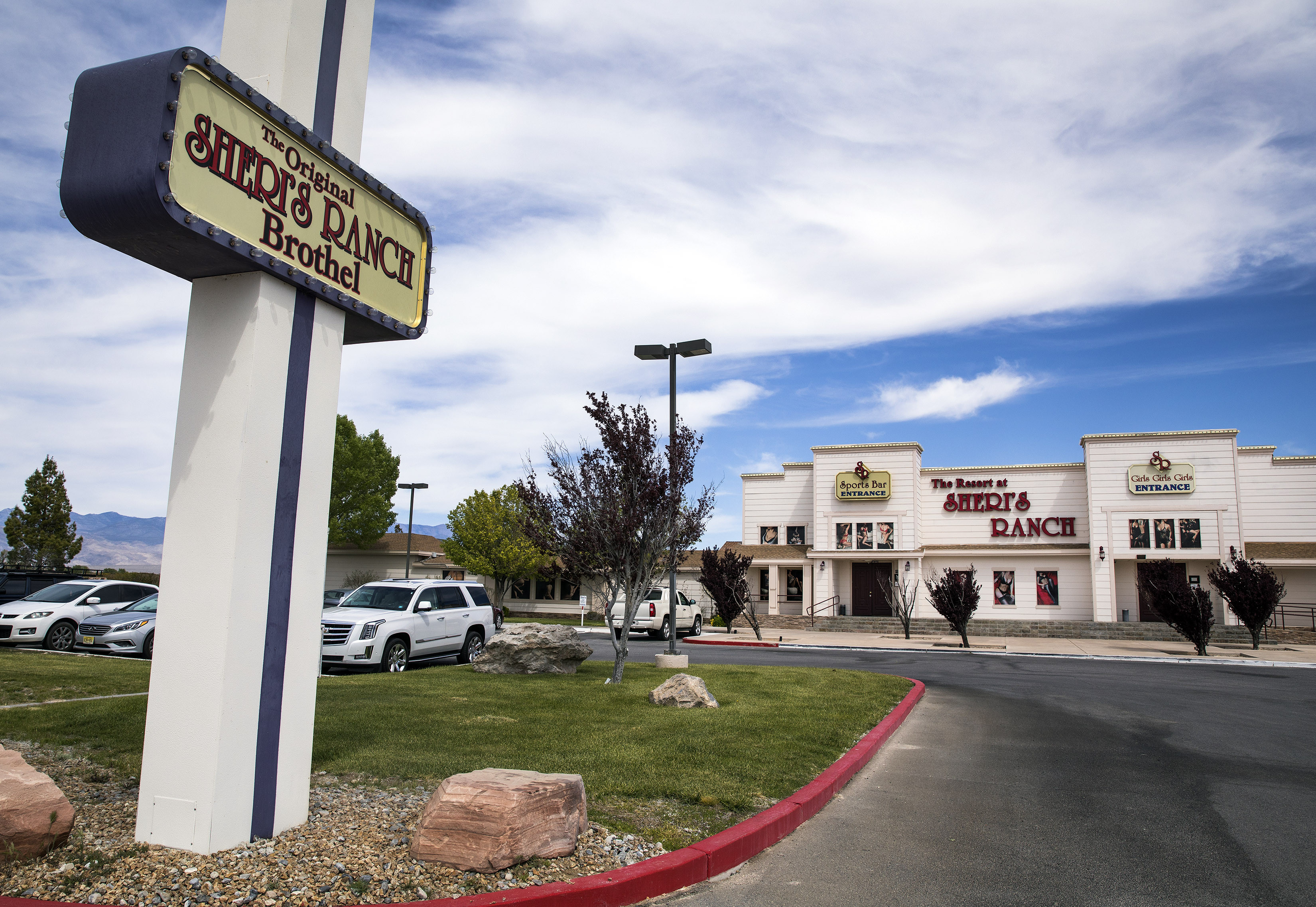The legality of prostitution in the United States is a complex and often misunderstood issue. While widely illegal across the country, there’s one notable exception: Nevada. This state has a unique legal framework where prostitution is permitted, but with significant restrictions. This article delves into the specifics of where prostitution is legal in the United States, focusing on Nevada’s distinctive laws and regulations, and clarifying common misconceptions.
Nevada’s reputation as a state with legal prostitution often draws tourists seeking experiences unavailable elsewhere in the United States. However, the reality is far more nuanced than popular perception. It’s crucial to understand that even within Nevada, legal prostitution is not widespread and operates under strict limitations.
 alt text: People line up outside Chicken Ranch brothel in Pahrump Nevada, illustrating a legal prostitution establishment.
alt text: People line up outside Chicken Ranch brothel in Pahrump Nevada, illustrating a legal prostitution establishment.
The Limited Legal Landscape of Prostitution in Nevada
To understand where prostitution is legal in the United States, it’s essential to focus on Nevada’s specific counties. Nevada law explicitly prohibits prostitution and solicitation in most areas. The key exception lies in licensed brothels, but even these are not allowed everywhere.
County-Level Decisions: Nevada law grants counties the authority to decide whether or not to permit licensed brothels. This local control results in a patchwork of legality across the state. As of now, prostitution is legal only in designated counties that have chosen to allow it.
Counties Where Brothels are Legal: Currently, only a limited number of Nevada counties permit licensed brothels. These include:
- Esmeralda County: Brothels are permitted throughout the county.
- Lander County: Brothels are permitted throughout the county.
- Mineral County: Brothels are permitted throughout the county.
- Nye County: Brothels are permitted throughout the county.
- Storey County: Brothels are permitted throughout the county, famously including the Mustang Ranch.
- Elko County: Brothels are permitted only in some incorporated communities within the county.
- Humboldt County: Brothels are permitted only in some incorporated communities within the county.
- Lyon County: Brothels are permitted only in some incorporated communities within the county.
- White Pine County: Brothels are permitted only in some incorporated communities within the county.
It’s important to note that even in counties where brothels are legal, street prostitution and other forms of unregulated sex work remain illegal. The legality is specifically tied to licensed brothels operating within these designated areas.
Counties Where Prostitution is Illegal: Prostitution is illegal in the more populous counties of Nevada, including:
- Clark County: This includes Las Vegas, a major tourist destination often mistakenly associated with legal prostitution.
- Washoe County: This includes Reno.
- Carson City: The state capital.
- Pershing County
- Douglas County
- Eureka County
- Lincoln County
Therefore, despite Nevada’s reputation, major cities like Las Vegas and Reno strictly prohibit prostitution. Legal brothels are primarily found in rural counties.
A Historical Perspective on Nevada’s Prostitution Laws
Nevada’s tolerance of prostitution has deep historical roots, tracing back to the state’s mining boom in the 19th century. While prostitution wasn’t explicitly legal in the early days, it was largely tolerated, particularly in brothels. This contrasted with much of the United States, where anti-prostitution movements gained momentum in the late 19th and early 20th centuries.
Early Tolerance and Gradual Legalization: Unlike many states that moved to outlaw prostitution in the early 20th century, Nevada maintained a more lenient stance. Although not officially sanctioned, brothels operated openly for decades. The landmark moment came in 1971 when Storey County officially licensed the Mustang Ranch Brothel, marking the first legally recognized brothel in Nevada. This set the stage for the regulated system that exists today.
The 1971 Turning Point: The licensing of the Mustang Ranch was a pivotal moment, solidifying Nevada’s unique approach to prostitution. It moved the state from a position of tolerance to one of regulated legality in specific areas. This legalization was not statewide but rather enabled at the county level, paving the way for the current geographically limited legal framework.
Regulations and Operations of Legal Brothels in Nevada
Nevada’s legal brothels operate under a strict regulatory framework designed to ensure safety and control. This regulation covers various aspects, from licensing and health checks to advertising and taxation.
Licensing and Oversight: Brothels must obtain licenses from the counties where they operate. These licenses are subject to renewal and can be revoked for violations of regulations. The licensing process involves background checks and adherence to specific operational standards.
Health and Safety Regulations: A cornerstone of Nevada’s legal brothel system is the emphasis on health and safety. Sex workers in legal brothels are required to undergo regular STD testing, typically weekly. This is a significant measure aimed at preventing the spread of sexually transmitted infections. Furthermore, brothels are subject to inspections to ensure hygiene and safety standards are maintained.
Economic Aspects and Taxation: While there isn’t a specific excise tax on sex acts in Nevada, brothels and sex workers contribute to the local economy through various fees and taxes. Brothels pay licensing fees that vary based on size and location. Sex workers are considered independent contractors and must obtain state business licenses and pay registration fees, which also vary by county. These revenues contribute to local government funding.
Advertising Restrictions: Nevada law places restrictions on how brothels can advertise. They are prohibited from advertising in jurisdictions where prostitution is illegal and face limitations in public advertising even where it is legal. This is intended to maintain a degree of discretion and prevent overt promotion of prostitution in areas where it is not permitted.
 alt text: Sheri’s Ranch brothel in Pahrump Nevada, showcasing a typical legal brothel establishment in a rural setting.
alt text: Sheri’s Ranch brothel in Pahrump Nevada, showcasing a typical legal brothel establishment in a rural setting.
The Ongoing Debate and Challenges
Despite its legal status in certain Nevada counties, prostitution remains a subject of ongoing debate and faces various challenges.
Efforts to Ban Brothels: There are persistent efforts to ban brothels even in counties where they are currently legal. These efforts often stem from moral objections, concerns about human trafficking, and the desire to change Nevada’s image. Recent campaigns in counties like Lyon and Nye demonstrate the ongoing push to outlaw brothels through local ballot initiatives.
Ethical and Moral Considerations: The legality of prostitution raises complex ethical and moral questions. Opponents argue that it inherently exploits women, contributes to human trafficking, and is morally objectionable. Proponents emphasize the potential for regulation to provide safer working conditions, health oversight, and economic benefits compared to illegal, unregulated prostitution.
Varying Perspectives within Nevada: Even within Nevada, there are diverse opinions on legal prostitution. Some residents view it as a legitimate business that generates revenue and provides a degree of regulation. Others are uncomfortable with the industry and support efforts to ban it. Sex workers themselves have varying perspectives, with some emphasizing the agency and choice they experience in legal brothels, while others raise concerns about exploitation and working conditions.
Conclusion: Nevada’s Unique Position and the Broader US Context
In conclusion, when considering “Where Is Prostitution Legal In The United States,” the answer is definitively limited to specific counties within Nevada. It is crucial to dispel the misconception that prostitution is widely legal across Nevada or in major cities like Las Vegas. The legal framework is geographically restricted and tightly regulated to licensed brothels in counties that have chosen to permit them.
Nevada’s unique legal stance is a product of its history, local control, and ongoing debates about morality, regulation, and the sex industry. While efforts to ban brothels continue, for now, these licensed establishments remain the only legally sanctioned locations for prostitution in the United States, offering a stark contrast to the widespread prohibition in the rest of the country. This makes Nevada a unique case study in the complex and evolving landscape of prostitution laws in the United States.
